How to Fix 9 Screen Recording Errors
For many people, screen recording is now a must-do, whether it's for educational videos, game sessions, or just capturing moments on their device. But it can be very annoying when you ask yourself, "Why is my screen recording not working?"
There are many reasons why it might glitch, including problems with the software, mistakes made by the user, and permission settings. In this article, we’ll delve into the most common issues that can prevent screen recorders from functioning properly. We will also show you how to solve problems step by step.
Let's look into why your screen record might error and how to fix it.
Why is my screen recording not working?
When your tool fails, it can be a perplexing experience. The causes can range from simple personal errors to more complex OS issues.
We will talk about some common reasons why your screen record is not working and how to fix them.
Reason 1. Permission
One of the most common problems with your device is permission problems. To protect your privacy, operating systems have strict rules that say that applications, like screen recorder, need your authorization to access your desktop and webcam.
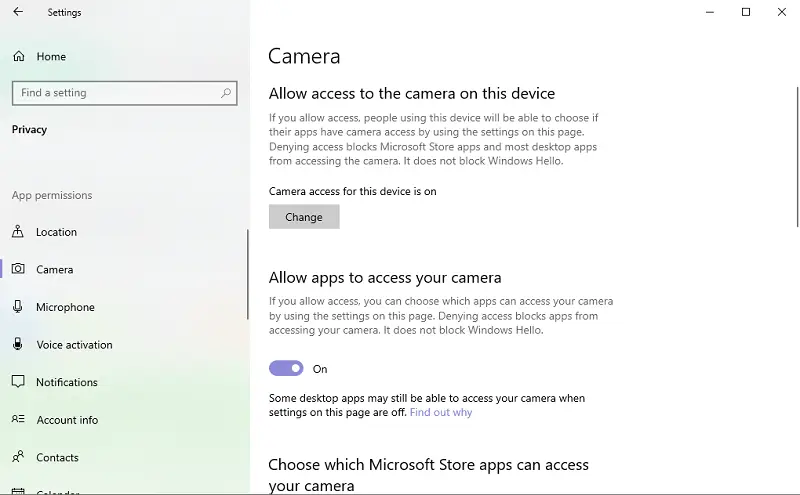
Solutions:
- Windows: Go to Settings > Privacy > Camera and ensure the app you’re using has permission.
- Mac: Go to System Preferences > Security & Privacy > Privacy, and check if the app is listed and enabled.
Reason 2. Software Glitches
These can happen for a number of sources, such as bugs with the operating system, issues with the screen recording software itself, or conflicts with other programs that are running on your PC.
Causes:
- Updates to the OS can introduce bugs that affect the functionality.
- The app itself may have errors that prevent it from operating correctly. This is especially common with newer or less frequently updated programs.
- Other processes running simultaneously can interfere with the session, particularly if they use similar resources or permissions.
- Corrupted installation files or data within the recording program can cause it to malfunction.
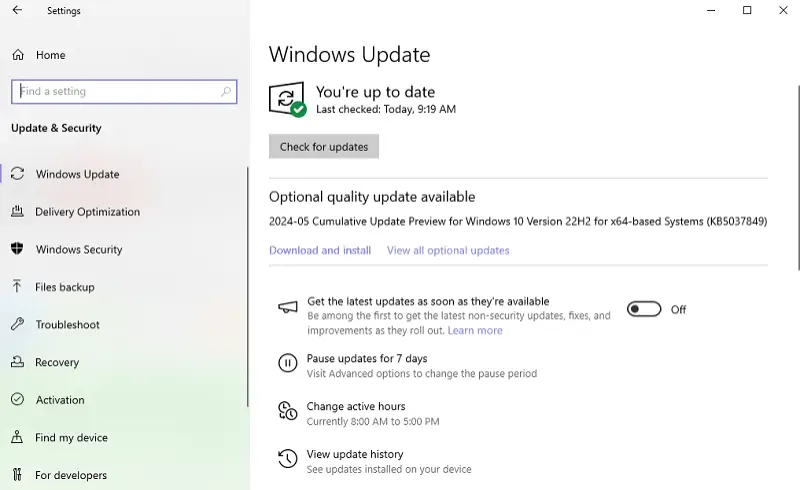
Solutions:
- Restart your device to clear temporary issues.
- Update your operating system and software to the latest version.
Reason 3. Insufficient Storage
Videos, especially those of high quality, consume a significant amount of storage space. If your device is running low on storage, the capturing might fail to start or stop on time.
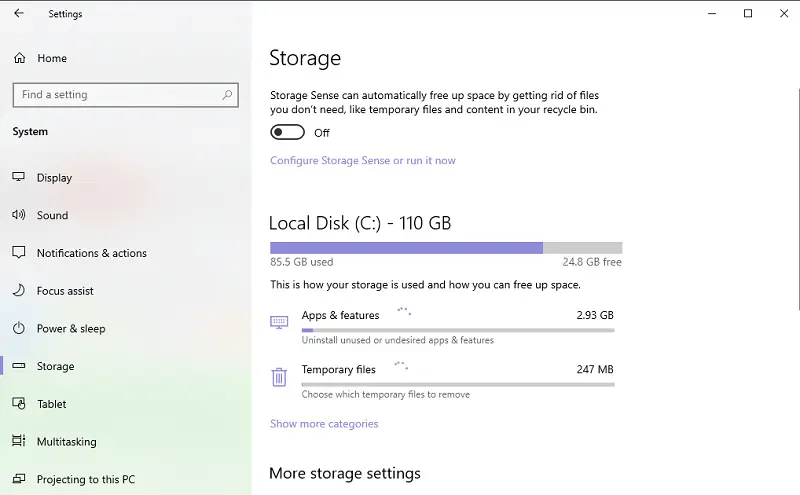
Solutions:
- Check your available storage and free up space by deleting unnecessary files or apps.
- Adjust the capture settings to lower the resolution or quality to reduce the size.
Reason 4. Compatibility Issues
Compatibility issues can arise when the desktop recorder you're using is not fully supported by your operating system version, hardware specifications, or other software dependencies.
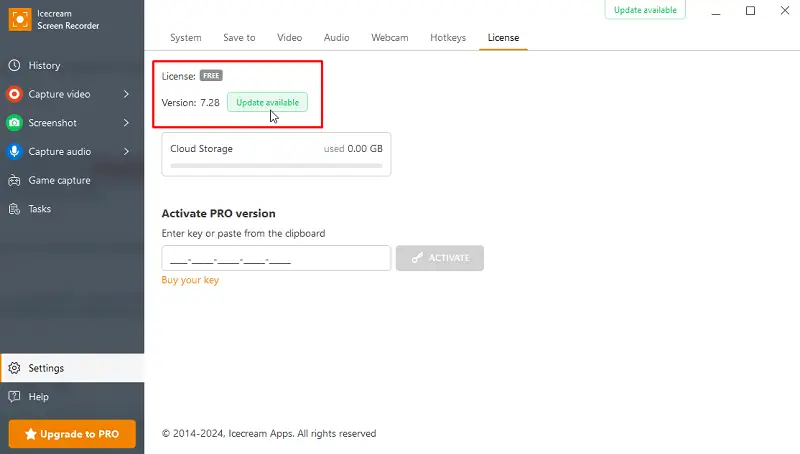
Solutions:
- Ensure that both your device's OS and the screen recording app are updated to the current versions.
- Review the requirements for compatibility.
- Experiment with different applications until you find one that meets your needs and works smoothly on your computer.
- Disable or enable specific features or options within the app that may be causing conflicts.
If you're unable to resolve compatibility problems on your own, reach out to the developer's support team for assistance.
Reason 5. Background Processes
These processes consume system resources such as CPU, memory, and disk I/O, which can interfere with the operation of video recorders. Identifying and managing these background tasks is fundamental to optimizing your PC's performance during sessions.

Solutions:
- Identify non-essential applications consuming resources and close them using "Task Manager" (Windows) or "Activity Monitor" (Mac).
- Monitor CPU, memory, and energy impact columns to identify resource-intensive tasks.
- Turn off unnecessary startup programs by right-clicking and selecting "Disable".
Reason 6. Audio Settings
Sound settings are very important because they affect the quality and clarity of the audio that is captured with the video. If you make the wrong changes, your clips may not have sound, be of low quality, or have problems with syncing.
If you set things up right, your screen capture will have clear audio that matches the visual.
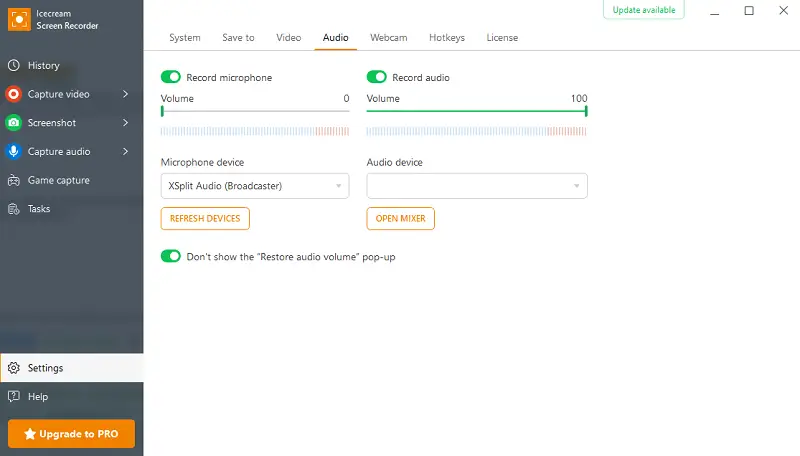
Solutions:
- Ensure that the correct audio input and output devices are selected in your screen recorder.
- Check the system sound settings to verify the microphone and system sounds are enabled.
- Enable or disable AGC to automatically adjust input levels based on the volume of the signal.
- Monitor audio levels in real-time during the process to detect any issues (e.g., clipping, background noise) and make on-the-fly changes.
Reason 7. Security Restrictions
These restrictions are designed to protect sensitive information and prevent unauthorized access to data. While these measures enhance security, they may also prevent legitimate activities, particularly in enterprise or educational environments.
Solutions:
- Seek authorization from system or security administrators and IT departments to use the program in places with strict policies.
- Try a desktop recorder that is approved or provided by your organization, institution, or is compliant with policies.
- If possible, utilize a personal device or network to perform screen recording.
Reason 8. Outdated Drivers
Drivers act as the communication bridge between your operating system and hardware components, such as graphics/sound cards, and input devices.
When these drivers are outdated, it can result in the screen recorder not working, software crashes, or compatibility issues that disrupt your ability to capture your display effectively.
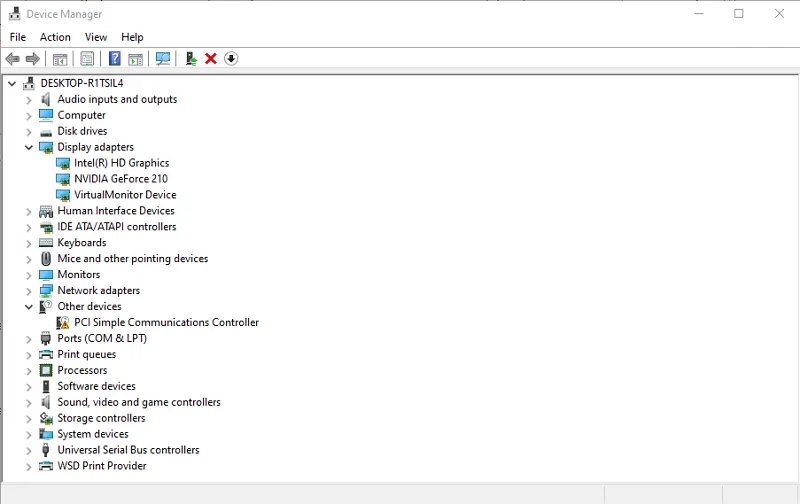
Solutions:
- Update your graphics and audio drivers to the latest version from the manufacturer’s website.
- Use automatic update tools (e.g., Windows Update, macOS Software Update) to keep drivers up-to-date.
Reason 9. Overloaded CPU or Memory
Screen recording requires both processing power and memory, as it captures video frames, encodes them, and stores the resulting file.
If the system resources are already being heavily utilized by other applications, the screen recorder might fail to function properly.
How to fix it?
- Close any applications running in the background that are consuming too much CPU or memory.
- If your hardware allows it, you can upgrade your RAM or invest in a faster CPU to improve overall system work.
- Some recording apps are more lightweight and optimized for performance, making them less taxing on system resources.
- Utilize Task Manager (Windows) or Activity Monitor (Mac) to monitor CPU and memory usage. This helps you identify which programs require the most resources.
By understanding these common reasons and applying the corresponding solutions, you can resolve many problems that prevent your session.
If the screen capture still isn't working, consulting the support documentation for your specific device or app may provide additional guidance.
Why won't my screen record work on Android?
| Issue | Fix |
|---|---|
| Feature Disabled | Verify if screen capture is activated in settings or try an alternative app. |
| Insufficient Storage | Clear unnecessary files or transfer data to an SD card or cloud service. |
| DRM Protection | Certain platforms (e.g., Netflix, Prime Video) prevent recording—test with a different application. |
| Low Charge | Plug in your device or turn off power-saving settings. |
| Glitch | Restart your phone or install the latest updates. |
| Outdated OS | Upgrade Android via Settings > Software Update if a newer version is available. |
| Conflict with Other Apps | Close running programs or remove interfering ones. |
| Microphone Not Working | Enable audio input access in the permissions. |
| Device Limitations | Older models may not support this function—check your phone's specifications. |
| Lack of Necessary Permissions | Grant access to storage and display in system settings. |
Why can't I screen record: FAQ
- Why is my screen recorder not saving the videos?
- First, verify the save location in the software settings to ensure it’s a valid directory. Also, ensure there is enough free disk space available.
- Why is my screen recording out of sync?
- A high system load can cause synchronization issues. To fix this, close unnecessary applications to relieve system resources.
- Why won't my screen record work on multiple monitors?
- See if your program can work with more than one monitor. Make sure you have the right app because some of them need a premium version for this feature.
- Why do I get an error message saying "Recording Failed"?
- This error can be due to a lack of available system resources, such as RAM or CPU power. Free up resources by stopping other processes, and search for patches that might address this error.
- Why is there a green screen?
- Verify you have the right codecs installed, and think about updating them or using a different format. Some graphics cards don't work with all apps, so check for updates or try a different app. It might also help to turn off hardware acceleration in the settings.
- Why can't I record certain video calls?
- Some video conferencing applications have built-in restrictions that prevent the session. Additionally, be aware of privacy laws and regulations regarding capturing meetings, and ensure all video participants are legally informed and have consented.
- Why is there an echo in my screen recording?
- To eliminate echoes, make sure that only one microphone is active, or employ headphones to prevent picking up sound from your speakers.
Conclusion
It can be scary when screen recording doesn't work, but with the right troubleshooting steps, it's usually possible to fix the problem. By carefully figuring out the root cause and using the right solutions from this article, you can ensure that their experiences go smoothly and are useful.
During the debugging process, it's important to stay calm and methodical. Also, keeping up with system maintenance, like updating software and managing storage space, can help keep problems from happening in the first place.
If you keep having problems that the advice in this guide doesn't help with, don't be afraid to ask on online forums, call technical support, or ask a knowledgeable coworker how to fix screen recording.


